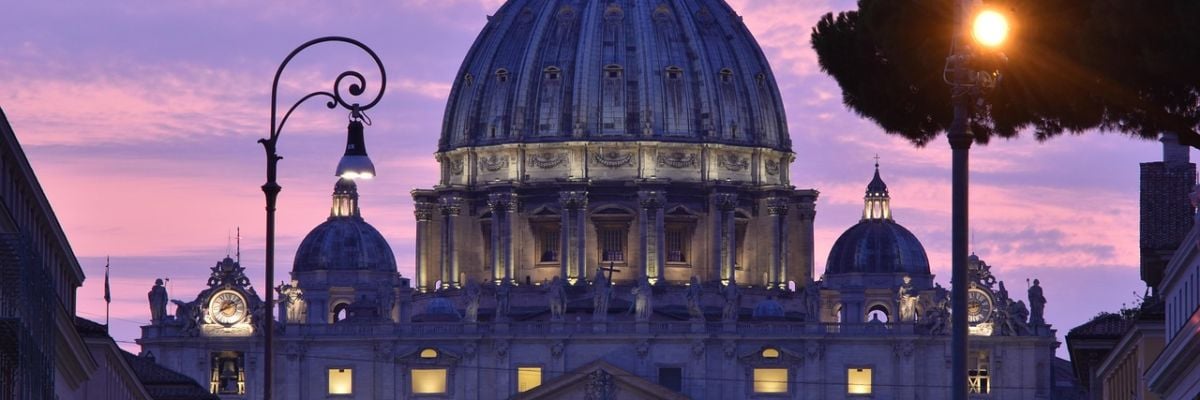
In this episode of Catholic Answers Live, Jimmy Akin joins Cy Kellett to address a major point of division between Roman Catholic and Eastern Orthodox Christians: the role of the pope. Drawing directly from Scripture, Jimmy lays out a brief biblical case for the papacy, showing how the authority given to Peter—and his successors—points clearly to the Catholic Church.
Transcript:
Caller: Just quick question. What do you think is the best argument against Orthodoxy?
Jimmy: Well, there are a few arguments that I used when I was evaluating this question because I came into traditional Christianity from a Protestant angle. And so I knew I needed to either become Catholic or Orthodox. In sorting through that, there were a few arguments that I discerned that split that, you know, indicated I needed to become Catholic. I’ve written about them in an article called “Why I’m Not Eastern Orthodox.” So you can Google “Jimmy Akin Why I’m Not Eastern Orthodox” and read about them.
But one of the key ones that struck my mind is the issue with the papacy, which is central here because the other differences are not on the same level of magnitude as the issue of the papacy. If the Catholic Church is right about the papacy, then the others tend to fall into line anyway. So this is the central issue.
It occurred to me that both Catholics and Orthodox acknowledge that the Bishop of Rome is the successor of Peter in a unique sense, and that he has correspondingly a special role in the Church. Sometimes that’s described as him being a first among equals, or to use Latin for it, primus inter pares. But he’s got a special role in the Church.
So how can we figure out which understanding of that role is the correct one? Here I would make a couple of points. The first one is the tack that’s taken by some Orthodox, which would be to say that he has a purely ceremonial special role, like a first among equals, kind of like the Chief Justice of the US Supreme Court. He has some special ceremonial functions, like he gets to assign cases to justices if he’s in the majority, but he has only the same vote as everybody else.
So he’s got a kind of ceremonial authority, but no substantive authority that’s different than any other justice. Well, if you apply that model to the papacy, that’s a concept that they wouldn’t have had in the ancient world. We have multiple passages in three of the four Gospels where Jesus gives Peter a special role among the apostles. If you’re given authority by Jesus, then you need to interpret the nature of that authority in terms of what authority looked like in ancient Near Eastern societies, in Judaism in particular.
They did not have the concept of purely ceremonial authority or a first among equals. In first-century Judaism, if God gave you authority, you could use it. He gave you authority. And so I think that just by examining the thought world of the time, we should understand the nature of Peter’s role and Peter’s authority in terms of substantive rather than ceremonial authority.
Also, it occurred to me that you have these two groups, Catholics and Orthodox, agreeing that the Bishop of Rome has this special role. Well, who is God more likely to guide into a correct understanding of that special role? Is it the group that has the special role within it, or is it the group that’s in separation from the special role?
As an analogy, I would point to the function of the Temple in ancient Israel, just like the Pope is a special institution in the Church today. The Temple was a special institution in ancient Israel, and there was a similar split when the ten northern tribes seceded. Politics has always been turned around in the Middle East, so of course the north secedes from the south there.
When the ten northern tribes seceded, that was blessed by God. He said, “That’s fine, but you still need to stick with the Temple in Jerusalem.” And they didn’t. The Samaritans ended up building another temple on Mount Gerizim, and that’s where they worshiped instead of worshiping at the Temple in Jerusalem.
From the biblical data we have, we know that that was a mistake. That’s something the authors of the Old Testament are very clear about. We see these two groups that have separated. One of them, the southern kingdom, has this institution of the Temple, and the other group that is in separation from the Temple has an erroneous understanding of it.
Whereas the group that has the Temple is guided into a correct understanding of the Temple. I would say the same thing would be true of the papacy. The group that has the papacy is the one we should presume has been guided into a correct understanding of it, while the group that’s in separation from the papacy, we should assume that that’s not the correct understanding.
So those would be the basic arguments that I would present. There are others I could go into, but if you’re asking what’s the best argument, it has to do with the papacy and the points I’ve just laid out, at least at a 30,000-foot top-level view.
Cy: That makes sense to you, Sal?
Caller: Yeah, no, it does. Very good.
Jimmy: Well, thank you for the call.



